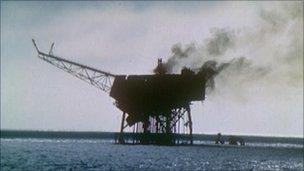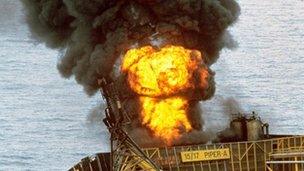Piper Alpha judge Lord Cullen says safety changes 'reduced risk'
- Published
Lord Cullen gives his first major interview on the Piper Alpha disaster since he chaired the inquiry into the explosion
The judge whose report into the Piper Alpha oil platform explosions 25 years ago led to massive changes in offshore safety has given his first major interview to BBC Scotland.
Lord Cullen's 13-month inquiry led to a radical overhaul of safety practices, with his changes still in place.
He has always maintained a silence over his report.
But now he wants to help the industry examine offshore safety in the 21st century.
The retired judge is the keynote speaker at a conference on the legacy of Piper Alpha being staged in Aberdeen next week.
A total of 167 men died on 6 July 1988 as explosions and a fireball ripped through the rig.
Maintenance and upgrading work had been under way but Piper Alpha had been continuing to produce oil.
The government ordered an inquiry which would last a year and lead to huge changes in the way safety is assessed and managed.
Before any installation could operate, a full safety case would have to be presented, assessed and approved.

The Piper Alpha disaster in 1988 cost 167 men their lives
The man who came up with the regime told BBC Scotland it was a difficult inquiry to preside over.
He said: "It was a huge challenge for me because, although I had experience of some litigation to do with the North Sea, I knew really nothing about installations and how they work, or should work.
"I was a relatively young judge, taken out of my normal work to do this, but I was hugely assisted by the team which was assembled to support me and also by the fact that on all sides - the industry, the workforce and those who were affected by what happened - there seemed to be a common will to create something positive out of a terrible disaster."
A conflict was initially identified at the Department for Energy, which was responsible for both production and safety in the North Sea.
The latter would become the charge of the Health and Safety Executive.
In all, 106 changes were recommended by Lord Cullen and all accepted by the industry.
He recalls: "The industry suffered an enormous shock with this inquiry, it was the worst possible, imaginable thing.
"Each company was looking for itself to see whether this could happen to them, what they could do about it.
"This all contributed to a will to see that something better for the future could be evolved."
Safety arrangements
In terms of death and injury, nothing offshore has ever come close to what happened at Piper Alpha.

The deadly explosions on the Piper Alpha platform prompted major changes in offshore safety
Since procedures were changed, fatalities have fallen sharply and continue to drop.
Most incidents are put down to personal safety rather than control of the hydrocarbons, or what most people call oil and gas.
He said: "Hydrocarbon escapes are really the most important thing because that should be the great drive, to reduce those.
"They could be a signal of something that has gone wrong which could cause problems later on if it is not attended to."
Perhaps the most important question for those who work offshore is whether Lord Cullen thinks something like Piper Alpha could ever happen again?
"People have written the words 'never say never' and I wouldn't be so presumptuous to say something really bad couldn't ever happen but we have done a great deal to reduce the risk and the rest is over to the way in which management handles its safety arrangements."
- Published20 September 2012
- Published28 May 2012
- Published20 April 2011